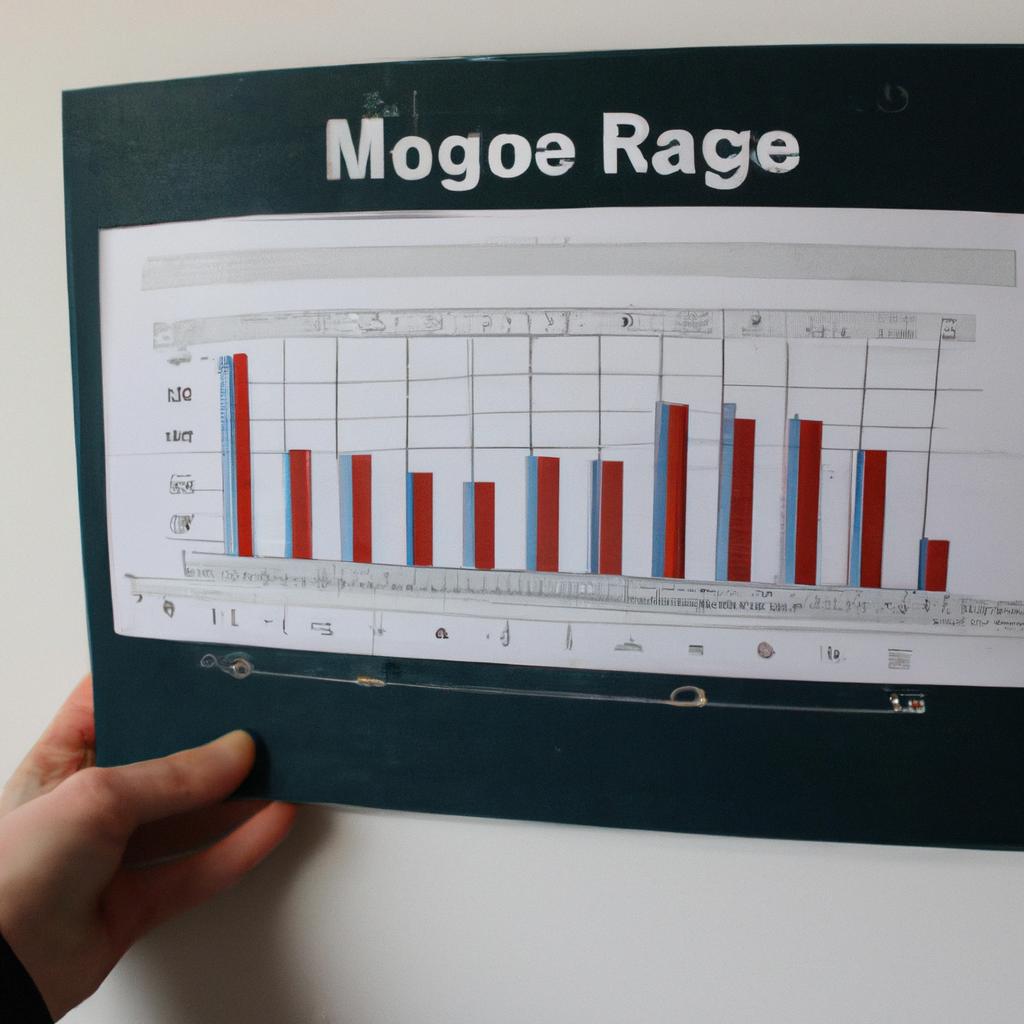The Federal Housing Administration (FHA) loan program has become increasingly popular in the mortgage market due to its unique features and benefits. This article aims to explore the various aspects of FHA loans, focusing particularly on their mortgage rates and advantages for borrowers. To illustrate these points, we will examine a hypothetical case study of a potential homebuyer named John who is considering an FHA loan.
In recent years, many individuals like John have turned to FHA loans as a viable option for financing their dream homes. The main attraction lies in the relatively low down payment required compared to conventional mortgages. For instance, while traditional lenders typically demand a down payment of at least 20%, an FHA loan allows borrowers to make a down payment as low as 3.5%. In our case study, this means that John can purchase his desired property worth $200,000 with just $7,000 upfront instead of the hefty sum of $40,000 demanded by other lenders. By reducing the initial financial burden, FHA loans provide greater accessibility and affordability to homeownership opportunities for individuals who may not have substantial savings or equity available.
What are FHA loans?
FHA Loans: Mortgage Rates and Benefits in the Mortgage Market
FHA loans, also known as Federal Housing Administration loans, are mortgage loans that are insured by the government. These loans were introduced to provide affordable housing options for low-to-moderate-income individuals and families who may have difficulty qualifying for conventional mortgages. By offering more lenient eligibility requirements and lower down payment options, FHA loans aim to make homeownership accessible to a wider range of borrowers.
For instance, consider the case of John and Sarah, a young couple looking to purchase their first home. With limited savings for a down payment and a credit history still in the process of building up, they find it challenging to meet the strict criteria set by traditional lenders. However, with an FHA loan, John and Sarah can secure financing with a lower down payment requirement and potentially qualify even with less-than-perfect credit scores.
To understand the benefits further, let’s explore some key features of FHA loans:
- Lower Down Payment: One significant advantage is that FHA loans typically require a smaller down payment compared to conventional mortgages. This reduced upfront cost can be particularly helpful for first-time homebuyers or those without substantial savings.
- Lenient Credit Requirements: While most lenders place great emphasis on credit scores during the application process, FHA loans accommodate borrowers with lower credit scores or past financial hardships such as bankruptcies or foreclosures.
- Competitive Interest Rates: Despite being backed by the government, FHA loans often offer competitive interest rates comparable to other types of mortgages available in the market.
- Assumable Mortgages: Another unique aspect of FHA loans is their assumability feature. This means that if you decide to sell your property in the future, a potential buyer could assume your existing FHA loan instead of obtaining new financing at potentially different terms.
By considering these factors together, prospective homebuyers like John and Sarah can see how opting for an FHA loan may offer them a more feasible path towards homeownership. In the subsequent section, we will delve into the specifics of how FHA loans work and provide further insights into their application process and eligibility requirements.
How do FHA loans work?
FHA Loans: Mortgage Rates and Benefits in the Mortgage Market
FHA loans, also known as Federal Housing Administration loans, are mortgage loans that are insured by the government. They were created to provide affordable homeownership opportunities for individuals who may not qualify for conventional mortgages due to lower credit scores or limited down payment funds.
To better understand how FHA loans work, let’s consider an example. Imagine John, a first-time homebuyer with a modest income and a credit score below the average threshold required for conventional financing. Despite having saved enough money for a down payment, John finds it challenging to secure a loan from traditional lenders. However, he discovers that he qualifies for an FHA loan because of its more lenient eligibility criteria.
One of the key features of FHA loans is their competitive interest rates. The Federal Housing Administration sets limits on these rates to ensure they remain accessible to borrowers with less-than-perfect credit histories or other financial constraints. This aspect makes FHA loans an attractive option for those seeking affordable monthly payments.
Moreover, there are several benefits associated with FHA loans:
- Lower down payment requirement: While conventional mortgages typically require a substantial down payment (often around 20% of the purchase price), FHA loans allow borrowers to put down as little as 3.5%. This reduced upfront cost can make homeownership more attainable for many individuals.
- Flexible qualification guidelines: Unlike some conventional loan programs that have strict requirements regarding credit score and debt-to-income ratio, FHA loans offer greater flexibility in assessing borrower eligibility. This opens up doors for potential homeowners who may have encountered obstacles when applying for traditional mortgages.
- Streamlined refinancing options: The FHA offers streamlined refinancing programs that enable borrowers with existing FHA-insured mortgages to refinance quickly and easily without extensive paperwork or stringent underwriting requirements.
- Protection against default: Since all FHA-insured loans carry mortgage insurance premiums, the government provides a safety net for lenders in case borrowers default on their loans. This insurance reduces the risk for lending institutions and encourages them to offer more favorable loan terms.
In summary, FHA loans present an opportunity for individuals who may face challenges when obtaining conventional mortgages. These loans not only provide competitive interest rates but also offer benefits such as lower down payment requirements, flexible qualification guidelines, streamlined refinancing options, and protection against default. Understanding these advantages can help potential homebuyers make informed decisions about their mortgage choices.
Next section: What are the benefits of FHA loans?
What are the benefits of FHA loans?
FHA Loans: Mortgage Rates and Benefits in the Mortgage Market
How do FHA loans work? In order to understand the benefits of FHA loans, it is essential to grasp how they function within the mortgage market. Let’s consider an example to illustrate their workings. Imagine a young couple, Sarah and John, who are looking to purchase their first home. They have found a property that meets all their requirements but lack sufficient funds for a conventional down payment. This is where FHA loans come into play.
The Federal Housing Administration (FHA) insures these loans, which allows borrowers like Sarah and John to obtain financing with more lenient credit requirements and lower down payments than traditional mortgages. The primary objective of this government-backed program is to make homeownership accessible for individuals who may not qualify for conventional financing due to limited savings or past credit challenges.
Now let’s explore some of the benefits associated with FHA loans:
-
Lower Down Payments: One significant advantage of FHA loans is that they typically require a smaller down payment compared to conventional mortgages. While conventional lenders often ask for 20% down, FHA loans can be obtained with as little as 3.5% down, making them more attainable for first-time homebuyers or those with limited financial resources.
-
Competitive Interest Rates: Despite popular belief, FHA loan interest rates are generally competitive with other types of mortgages available in the market today. Borrowers benefit from affordable monthly payments over the life of their loan, allowing them greater flexibility when managing their finances.
-
Flexible Credit Requirements: Another appealing aspect of FHA loans is its relatively relaxed credit standards compared to conventional financing options. Individuals with less-than-perfect credit histories may still be eligible for an FHA loan if they meet certain criteria set by the lender.
-
Streamlined Refinancing Options: Once you secure an FHA loan, you also gain access to streamlined refinancing opportunities known as “FHA streamline refinances.” These options allow borrowers to lower their interest rates and monthly payments without the need for a full credit check or home appraisal, saving time and potentially thousands of dollars.
In summary, FHA loans offer numerous benefits that make homeownership more achievable for many individuals. The lower down payment requirements, competitive interest rates, flexible credit standards, and streamlined refinancing options contribute to making this mortgage program an attractive choice for prospective buyers.
Moving forward, let’s examine the eligibility requirements for FHA loans and how individuals can qualify for this type of financing.
What are the eligibility requirements for FHA loans?
Benefits of FHA Loans
One example of the benefits of FHA loans is illustrated through the case study of John and Sarah, a young couple looking to buy their first home. With limited savings for a down payment and a lower credit score, they were finding it difficult to qualify for conventional mortgage loans. However, with an FHA loan, they were able to secure financing with more favorable terms.
Firstly, one benefit of FHA loans is the low down payment requirement. Typically, borrowers are only required to put down 3.5% of the purchase price as compared to the traditional 20% down payment for conventional loans. This enables individuals like John and Sarah who may not have substantial savings to still afford homeownership.
Secondly, FHA loans offer competitive interest rates in the mortgage market. Although interest rates can vary depending on individual circumstances such as credit history and loan amount, generally speaking, FHA loans tend to have lower interest rates than conventional mortgages. This means that borrowers can save money over time by paying less in interest charges.
Additionally, another advantage of FHA loans is that they are more lenient when considering applicants’ credit scores. While conventional lenders typically require higher credit scores (often above 620), FHA lenders are willing to work with borrowers who have lower credit scores (usually around 580). This makes homeownership accessible to a wider range of people who may be working towards improving their credit profiles.
To further emphasize the benefits of FHA loans:
- They provide opportunities for individuals with limited savings.
- They offer competitive interest rates.
- They consider applicants with lower credit scores.
- They promote homeownership affordability.
In summary, FHA loans present several advantages such as low down payments, attractive interest rates, and flexibility regarding credit scores. These factors make them an appealing option for many potential homebuyers who would otherwise struggle to obtain conventional financing. In the following section, we will compare how FHA loans stack up against their conventional counterparts in more detail.
How do FHA loans compare to conventional loans?
Eligibility requirements for FHA loans ensure that borrowers meet certain criteria to qualify for this type of mortgage. Let’s take John, a hypothetical applicant, as an example. John is interested in purchasing his first home but has limited funds for a down payment and a less-than-perfect credit score. Despite these challenges, he might still be eligible for an FHA loan due to its more lenient qualifications.
Firstly, the Federal Housing Administration (FHA) requires borrowers to have a minimum credit score of 500 to qualify for an FHA loan with a 10% down payment. However, most lenders prefer applicants with higher credit scores, typically around 580 or above. In addition to credit history, debt-to-income ratio plays a crucial role in determining eligibility. Lenders want to see that the borrower’s total monthly debts do not exceed 43% of their gross monthly income.
Secondly, John should consider his financial stability when applying for an FHA loan. Applicants must demonstrate steady employment or income over the past two years. This requirement ensures that borrowers are capable of making regular mortgage payments. Self-employed individuals may face additional scrutiny regarding their income stability.
Lastly, it is important to note that there are limits on how much one can borrow through an FHA loan. These limits vary by location and are based on the median housing prices within each area. As of 2021, the maximum loan limit for single-family homes ranges from $356,362 to $822,375 across different regions in the United States.
To summarize:
- A minimum credit score of 500 is required (a higher score is often preferred).
- Debt-to-income ratio should not exceed 43%.
- Steady employment or income over the past two years.
- Loan limits depend on geographical location and median housing prices.
Consider how meeting these eligibility requirements could make homeownership possible for people like John who may have faced obstacles obtaining conventional mortgages due to limited funds or lower credit scores.
| Eligibility Requirements for FHA Loans |
|---|
| Minimum Credit Score Required |
| 500 (higher preferred) |
With a deeper understanding of the eligibility requirements, we can now explore how FHA loans compare to conventional loans. By examining the key differences between these mortgage options, borrowers like John can better determine which loan type suits their needs and financial situation.
Tips for obtaining an FHA loan
Comparison to Conventional Loans:
When considering FHA loans in comparison to conventional loans, it is important to understand the key differences that set them apart. One significant advantage of FHA loans is their lower down payment requirement, which can be as low as 3.5% of the purchase price. This feature makes homeownership more accessible for individuals who may not have a substantial amount saved for a down payment.
Additionally, FHA loans are typically more lenient when it comes to credit requirements. While conventional loans often require higher credit scores, an individual with a lower credit score may still qualify for an FHA loan. This flexibility can provide opportunities for those who have had past financial difficulties or limited credit history.
Furthermore, FHA loans offer borrowers attractive interest rates that are competitive with those offered by conventional lenders. These favorable rates contribute to making homeownership more affordable over time.
Tips for Obtaining an FHA Loan:
If you are considering applying for an FHA loan, here are some essential tips to help you navigate the process successfully:
- Start by researching and comparing different lenders offering FHA loans. Look for institutions that specialize in these types of mortgages and have experience working with first-time homebuyers.
- Gather all necessary documentation before starting the application process. This includes proof of income, employment history, tax returns, bank statements, and other relevant financial information.
- Work on improving your credit score if needed. While FHA loans are more forgiving regarding credit requirements compared to conventional loans, having a higher score will increase your chances of securing better terms and rates.
- Take advantage of pre-approval options available through various lenders. Being pre-approved gives you a clearer understanding of how much you can afford and allows you to make informed decisions during the house hunting process.
Emotional Response Bullet Points:
Consider the following emotional response bullet points when contemplating whether an FHA loan is right for you:
- Affordability: Lower down payment and competitive interest rates make homeownership more accessible.
- Flexibility: Lenient credit requirements provide opportunities for individuals with lower credit scores or limited credit history.
- Confidence: Pre-approval options give you a clearer understanding of your budget, allowing you to confidently navigate the home buying process.
- Potential Savings: Lower upfront costs and favorable interest rates can result in significant long-term savings.
Emotional Response Table:
| Benefit | Description | Emotional Appeal |
|---|---|---|
| Affordability | Lower down payment requirement makes homeownership more attainable | Achieving the dream of owning a home without breaking the bank. |
| Flexibility | Lenient credit requirements offer opportunities for those who have had past financial difficulties | Overcoming obstacles and gaining access to housing despite previous challenges. |
| Confidence | Pre-approval gives clarity on affordability, empowering buyers with knowledge during the house hunting | Making informed decisions with confidence throughout the home buying journey. |
| Potential Savings | Competitive interest rates and lower upfront costs can lead to considerable long-term savings | Building wealth and financial security through responsible homeownership. |
In summary, FHA loans provide several benefits compared to conventional loans, such as lower down payments, lenient credit requirements, and attractive interest rates. To obtain an FHA loan successfully, it is crucial to research lenders, gather necessary documentation, work on improving your credit score if needed, and take advantage of pre-approval options. By considering factors like affordability, flexibility, confidence, and potential savings associated with FHA loans, prospective homebuyers can make informed decisions that align with their goals and aspirations.
 SMI Loan
SMI Loan



